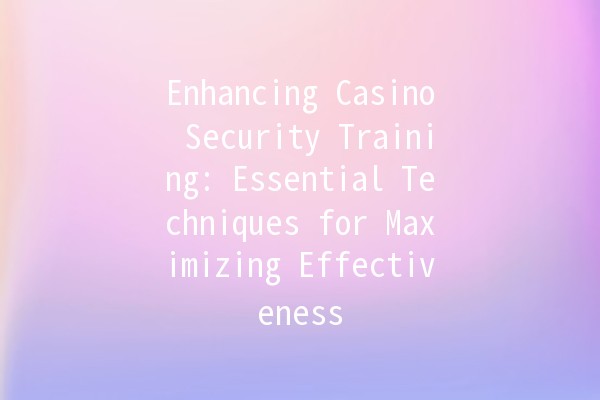As the gaming industry grows, so does the necessity for comprehensive security training in casinos. A strong security environment is critical not only for protecting assets but also for ensuring the safety and enjoyment of guests. In this article, we will highlight practical advice and actionable methods to enhance casino security training, ensuring organizations can stay ahead in their security protocols.
Understanding the Importance of Casino Security Training
In the realm of casinos, security training serves numerous purposes, including protecting patrons and staff, preventing cheating and theft, and ensuring regulatory compliance. The risks faced by casinos are significant, ranging from petty theft to organized crime. Therefore, a wellstructured training program is essential for fostering a conflictfree environment.
Key Objectives of Casino Security Training

Five Productivity Enhancement Techniques for Casino Security Training
To create a successful training program, it's crucial to apply certain productivity enhancement techniques. Here are five specific strategies to consider:
Description: This technique involves creating realistic scenarios where staff can practice their responses to potential security issues.
Implementation: Casinos can set up simulation exercises that mimic realworld threats. For example, a roleplaying exercise could involve actors simulating a robbery. Staff would then practice their responses in a controlled setting, learning how to handle various situations effectively.
Description: Incorporating technology can make training more engaging and informative.
Implementation: Utilizing virtual reality (VR) training modules allows employees to experience security threats in an immersive environment. For instance, a VR program could simulate a highstress situation, such as a fight breaking out on the casino floor, enabling staff to practice their responses in a safe space.
Description: Regularly scheduled courses help keep security protocols fresh in the minds of employees.
Implementation: Casinos can institute a biannual training schedule that covers updates in laws, new security technologies, and evolving threats. This could involve online webinars or inperson sessions where employees can ask questions and clarify concerns.
Description: Open lines of communication create an environment where employees feel encouraged to report suspicious activities.
Implementation: Training should include instruction on the importance of communication. For example, organizing regular meetings where staff can share experiences and discuss security issues can foster a team approach to security.
Description: A balance between security operations and customer service improves the overall experience for guests.
Implementation: Train security staff to view themselves as part of the customer service team. For example, staff could learn to manage security concerns discreetly, ensuring they uphold the casino's image while maintaining safety.
Frequently Asked Questions
Casinos must remain vigilant against various vital threats, including cheating, theft, and disturbances. Cheating methods may involve collusion among players or staff, while theft can range from small pilferage to largescale heists. Disturbances frequently arise from intoxicated patrons or disputes among guests.
To ensure compliance, casinos should regularly update their security training programs to reflect changes in the law. Staff should be trained on the regulations governing gaming operations, including responsible gaming practices and handling sensitive customer information.
Ongoing training is essential as it ensures that employees are aware of new threats and changes in protocols. Complacency can lead to vulnerabilities; thus, regular updates reinforce the importance of security and keep employees engaged.
Casinos can assess effectiveness through various means, including employee feedback, incident reports, and security audits. An increase in the detection of suspicious activities or a decrease in reported incidents may indicate a successful training program.
Management support is pivotal in establishing a culture of security. They should lead by example, prioritize budget allocations for training, and ensure staff recognize security training as a critical component of their roles.
Yes, effective security training can enhance customer experiences. When staff are welltrained, they can manage security situations smoothly, leading to a more enjoyable environment. Ensuring patrons feel safe encourages repeat visits and positive wordofmouth.
A robust casino security training program is paramount for maintaining safety and compliance within the gaming environment. By employing innovative techniques and fostering a culture of communication, casinos can prepare their employees to handle security challenges effectively. As the industry evolves, so too must the strategies for education and training in security practices. By prioritizing this training, casinos not only protect their assets but also enhance the overall guest experience, leading to continued success in a competitive marketplace.